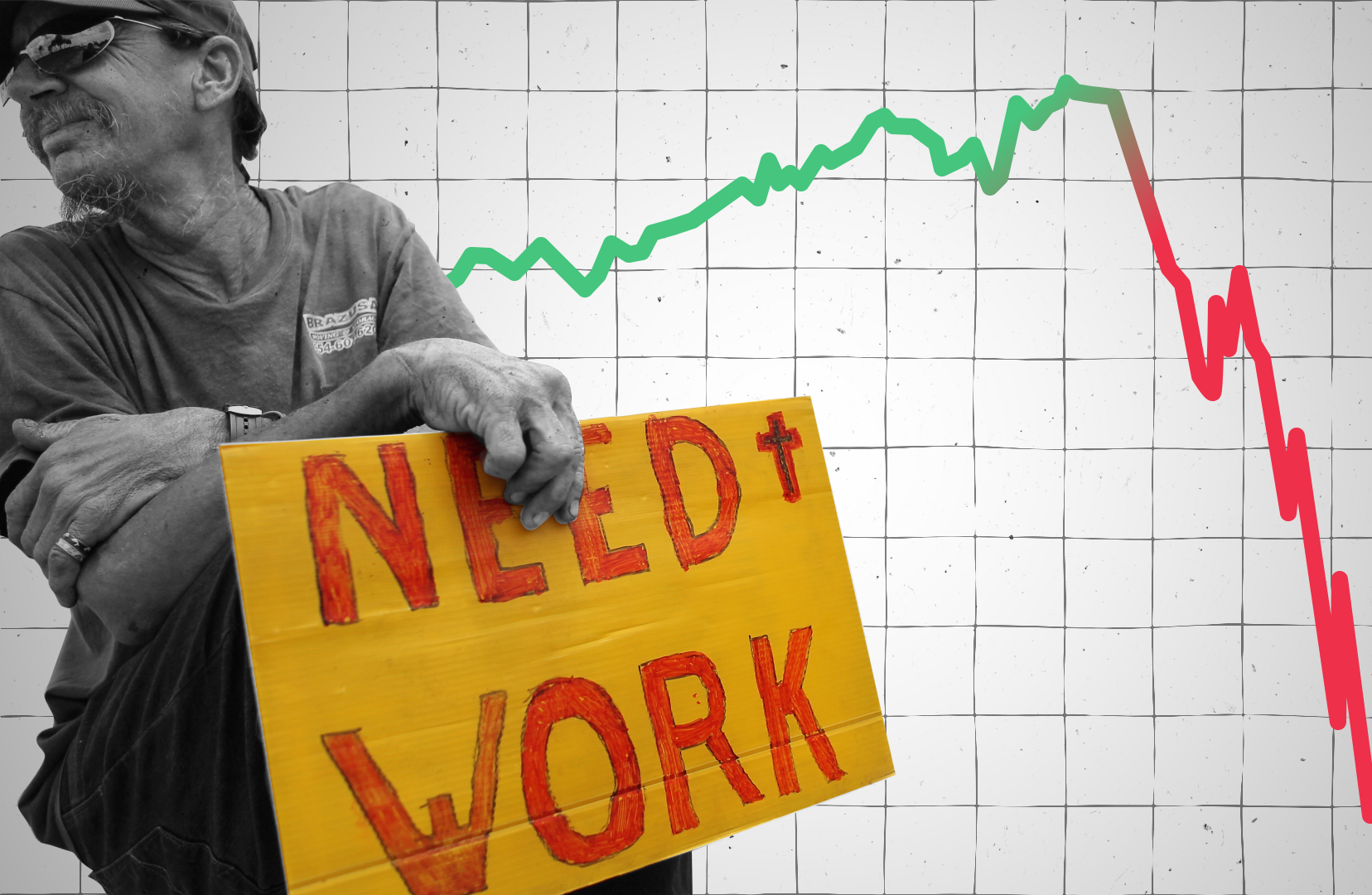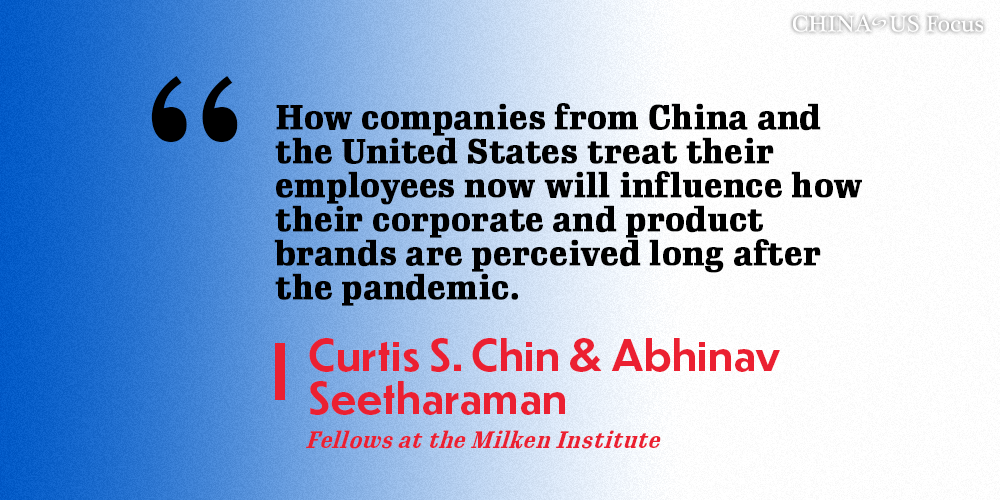Protecting Health & Jobs of Employees in a Pandemic Is a Key Test

The ongoing responses by the governments of China and the United States to the ongoing coronavirus pandemic could not be more different. A willingness and choice (or lack thereof) by citizens to embrace restrictions, trade-offs and losses of privacy for "the greater good" reflect each nation's histories and approach to governance.
There is one area though that employers on both sides of the Pacific should agree upon—committing to models of virtuosity, sustainability and the strongest environment, social and governance (ESG) standards when times are good is one thing. Adhering to these principles when the going gets tough for business is another matter, and it will not be easy. Yet, it can be done.
Though the forms and approaches will be different, cross-sector partnerships by businesses are vital in any nationwide solution to the challenge of COVID-19. Civil society—in its varying and contrasting forms—also must be engaged, and governments at all levels will have to play a role, whether through policy changes or direct or indirect financial support.
The ongoing COVID-19 pandemic has wreaked havoc not just in the United States and China but all across the Indo-Pacific region and our world. The pandemic has displaced populations, challenged governments and healthcare systems, and stretched the limits of “conscious capitalism” in some of the world’s most developed economies.
Even wealthy Singapore, with its exemplary governance, infrastructure, and business environment, has faced challenges. We see this first-hand in our work as fellows at the Milken Institute Asia Center, where we both serve at this non-profit, non-partisan economic think tank based in the city state.
During this public health crisis, the best—and not necessarily just the biggest—companies, including China's state-owned enterprises, should step forward and step up in their treatment of employees at home and abroad. Business leaders, executives and investors can help ensure that long-touted ESG leadership is not simply a buzzword from when times are good.
Regardless of what Beijing and Washington might mandate at home, all business stakeholders must focus on what the virus bodes for ESG standards implementation in third country markets where they operate, too. While the best environmental and governance practices have been embraced by many companies, their true test now emerges in the “S,” or social issues space.
Traditionally, the “S” in ESG has covered several topics, including product safety and consumer protection, labor practices, workforce diversity, and human rights across a company’s supply chain.

How companies and enterprises from China and the United States treat their employees in any given market will now influence how their corporate and product brands are perceived long after the pandemic. This will include treatment of female workers, contract employees and part-time staff. How a business treats all its employees, including those most in need, whether national or international staff, is a telling indicator and measure for the "S" in ESG.
Economic challenges are significant. Countries face what the International Monetary Fund (IMF) projects to be "a crisis like no other" and the worst recession since the Great Depression. According to the International Monetary Fund’s June 2020 world economic outlook report, the global economy is projected to shrink by 4.9% in 2020, a stark contrast to the 3.3% global GDP expansion for this year that it forecasted in January. That includes significant reductions in growth projections for China and the United States, but also for the markets in which they operate all around the world.
Southeast Asia is an example. The IMF expects the "Great Lockdown" recession to lead to an overall decline of some 2.0% in 2020 GDP of the five largest ASEAN economies—Thailand, Singapore, Malaysia, Indonesia and the Philippines. Importantly, these are markets where both Chinese and U.S. companies have significant investment, and thus the opportunity to showcase the reality of their ESG commitments.
The coronavirus has tremendously disrupted business and society. Companies continue to cut costs and re-evaluate their workforces, and countless employees live in fear over their job security.
Growing job loss numbers underscore the scale of the global coronavirus shock. In the United States, unemployment numbers continued to grow, reaching more than 26 million filings by the third week of April and thus nullifying all job gains made since the end of the last recession. Likewise in China, export-focused manufacturers continue to be impacted significantly, and small businesses, such as restaurants and small retail outlets, continue to struggle to re-open or to attract consumers once re-opened.
In June, the Asian Development Bank cut its forecast for this year's Chinese growth to 1.8% from 2.3%. Risks to the regional outlook in Asia and the Pacific, the ADB further noted, are "to the downside, given the potential for multiple waves of COVID-19, sovereign debt and financial crises, and renewed escalation in trade tensions between the U.S. and China."
The loss of a job in economies with limited social safety nets and where large portions of the workforce constitute the informal sector can be even more devastating on individual households.
Amidst these challenges, however, media reports abound of major businesses around the world vowing to take care of their workforce through a variety of new measures.
In the United States, software company Salesforce has pledged “not to conduct any significant layoffs over the next 90 days,” and will continue to pay its hourly workers while offices are closed. And Citi Singapore has announced a $850 (S$1,200) one-off special compensation award for employees earning below a minimum designated amount, as part of a global initiative to help more than 75,000 workers.
Importantly, large corporations are not the only ones showing the way. Numerous smaller businesses with significantly fewer resources have also stepped up to strengthen safety nets for their employees via innovative measures.
Good leadership is innovative. Good leadership is contagious.
Difficult times call for all companies—small, medium, and large, and family-owned, state-owned, privately-held or publicly-listed—to work towards greater employee security. Protecting employees today will enable businesses in China, the United States and elsewhere to establish a strong foundation for continued success and legitimate ESG bragging rights in a post-pandemic world.
